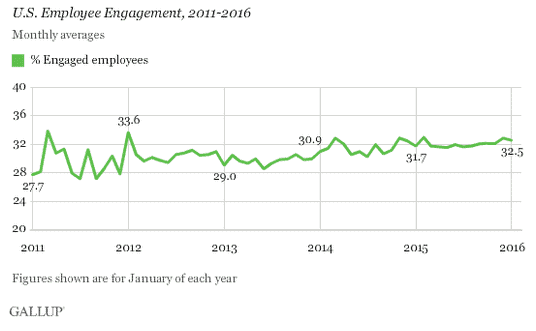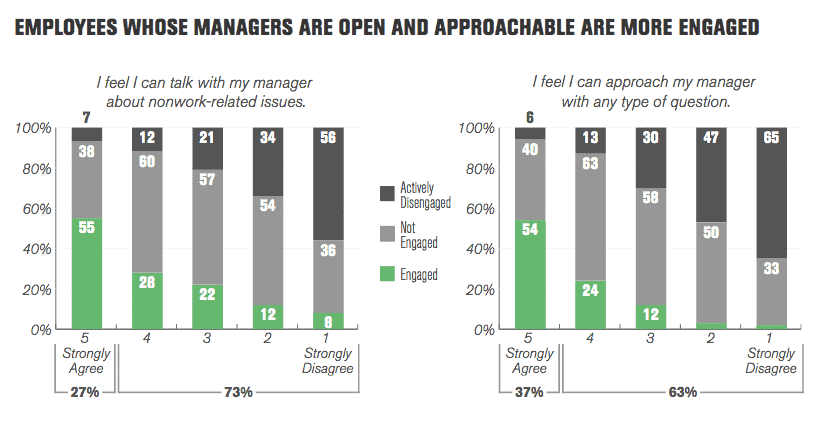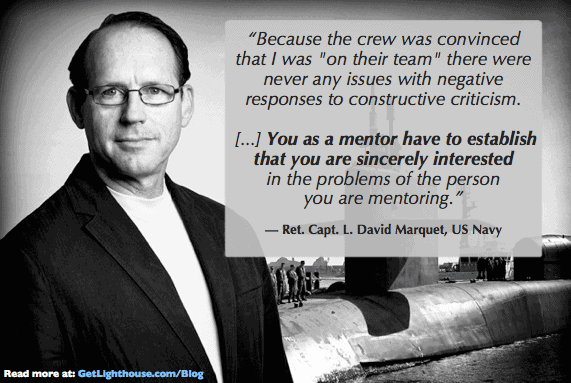It would be nice if everything at work was smooth sailing, butterflies and rainbows, with everyone working in perfect unison. But we know that's not the case. Work is messy.
Being a great company, or team, takes effort. And often, it requires a willingness to push through awkward moments and take on uncomfortable situations.
Unfortunately, it seems most managers are afraid to rise to these kinds of challenges as a new study by Interact Studio and Harris Poll revealed:
"69% of managers say there is something about their role as a leader that makes them uncomfortable communicating with their employees."
Is it any coincidence that Gallup's employee engagement score hovers extremely close to the inverse of this score of uncomfortable managers? (i.e.: 100% - 69% = 31%)
It seems likely that those that are engaged (27-33% of employees according to Gallup) are also those that have managers not afraid to communicate with them.
This theory becomes stronger considering one of Gallup's key findings in last year's State of the American Manager report:
Employees who don't feel they can approach their managers (right graph) have almost no chance they're engaged at work.
Communication, Communication, Communication.
Communication is a two way street. Those same managers that are afraid to talk to their team members, will most likely have team members afraid to come to them.
And all this lack of communication comes with high costs:
- Lost Feedback: Despite studies showing especially Millennials want more feedback, this means managers are avoiding something their team craves, and missing opportunities for improvement.
- Lost context and insights: There are many things a team member may miss out on hearing or being engaged in the discussion of, if the manager is afraid to talk with them. This prevents the team from sharing key insights with their manager, and will affect their ability to do their best work.
- Retention, morale, and turnover: Managers are the main point of contact between an employee and a company. If that relationship is poor (and a fear of communication makes that likely), they're a turnover risk to go somewhere they feel more wanted, valued, and connected.
So knowing that both sides are afraid at work, what do we do about it?
What to do about everyone being afraid at work
It wouldn't be a Lighthouse post without making things actionable, so here's 3 ways to help managers and team members alike overcome fears of communicating with each other.
1) Value and Build Rapport
If you have to tell someone that their sweater is ugly and has a hole in it, you'd rather have to tell a friend than a stranger, right?
While that situation may sound ridiculous the point isn't: people you feel a connection with are easier to talk to, and more receptive to your feedback.
Despite being a simple lesson, it's often forgotten in the workplace. This is why so many experts, like Rent the Runway's CTO, Camille Fournier, agree you should build rapport with your team and coworkers.
Do I have to be best friends with everyone at work?
No. Building rapport is not the same as being best friends. You can be interested in other people, value them, and not spend your free time with them.
Building rapport is simply showing an interest in them enough to get to know them beyond a job title and work tasks.
Then how do I build rapport?
Here's a few possible questions to help you get started:
- What drives you? What motivates you to come to work each day?
- What made you decide to come work here? What's your favorite part of working here?
- If they have children: How is [name of child] doing? (Ask something related to their age like starting school, playing sports, or other interests.)
- What do you like to do in your free time? What are your hobbies? What are you passionate about outside work?
- What did you do for fun in the past that you haven't had as much time for lately?
- Where did you grow up? Do you go back often?
Again, this is about showing an interest in who they are as a person.
You're not volunteering to babysit their kids, or necessarily going to go do their hobby with them. However, you might just find out some things you didn't know you had in common with them. That's rapport.
This effort then ties directly back to making communication easier.
Building Rapport = Better Communication
Captain L. David Marquet took the worst submarine in the US Navy and turned it into one of the best. In his book, "Turn the Ship Around!”, he emphasized how rapport was crucial to the reception of his feedback to the sailors serving under him:
If you find yourself afraid to communicate with someone at your company, ask yourself how well you know them. Often times, it's the lack of rapport and understanding the other person that makes it so intimidating.
Next time you're afraid at work, try building more rapport with the person you want to deliver feedback to.
2) Make the most of regular one on ones
One of the most common challenges managers have is a lack of time. Your to-do list and best intentions are always greater than what you can actually get done.
This is why one on ones are so important and valuable.
Good one on ones are a recurring habit that act as a catch-all for all kinds of topics. They are often the only time to do any of the following:
- Talk about career development and make progress on it.
- Give coaching and feedback to improve their performance.
- Ask your team for their private feedback and input.
- Check in how they're doing and their work satisfaction.
This is why Andy Grove, legendary leadership author and former CEO of Intel, was such a fan of one on ones when he wrote:
Like Pb&J: One on ones & Rapport
There's one more thing you can, and should, do in your one on ones: build rapport. It's the first step to making the most of the meetings, as that trust and connection you build is a foundation for all those other topics you can cover.
The beauty of the one on one is the recurring nature. By meeting with them on a set cadence at least once every few weeks, it forces you to not put off these conversations. Once you have them a few times, they'll get easier. You might even look forward to the one on ones, instead of being afraid and avoiding communication with them.
If you want to learn more about starting one on ones, or improve the ones you already have, these links can help:
- A step by step guide "How to start one on ones with your team"
- Over 100 Questions to make the most of your one on ones.
- The awesome approach Andy Grove uses to having awesome one on ones.
3) Lead by example
One of the hardest things about leadership is that those you lead will emulate you; that means your weaknesses can become theirs.
Fortunately, it also means that when you set a good example, your people are likely to follow suit. When you show courage and overcome the fear of giving feedback to your team, others are likely to as well.
Nelson Mandela, the legendary leader and former President of South Africa, has a great quote to help think about how you should lead in these situations:
The fears in your workplace are nothing compared to the incredible challenges Mandela faced in his life as he fought to overturn Apartheid, but the lessons are the same. When something is hard, intimidating, challenging, or scary at work, that is the time to lead in front of your people.
If you see that your employees are afraid to communicate with each other and have tough conversations, the example you set to have them is the single best thing you can do. You can then reinforce the fact you want others to also better communicate by citing your examples, and asking others to do the same.
---
Based on Interact's research, it appears being afraid at work is more wide spread than we may have thought. However, with a few simple approaches, you can overcome that fear of communicating with your team members, and drive better engagement with your team.
How have you conquered the fear of giving feedback to others at work?










